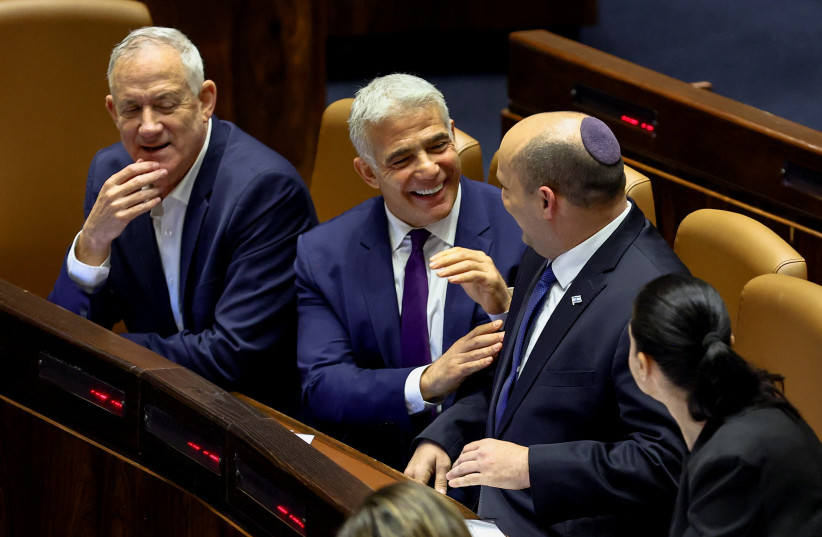Lawmakers overwhelmingly passed the initial bill to dissolving the Knesset on Wednesday, 110-0.
The MKs approved 11 different proposals, nine by the opposition and two by the coalition, that were brought to the floor together in a parliamentary process known as “hatzmada” (literally “attachment”), in which different law proposals that are very similar are packaged together.
The bills will now head to the Knesset Committee, which will decide whether to continue the process in that body or in the Law Committee. The Knesset Committee is headed by coalition rebel MK Nir Orbach, while the Law Committee is headed by Labor MK Gilad Kariv. The body that receives the bill can control the pace of its passing.
“We left you with a flourishing country,” said MK Yariv Levin (Likud).
“We left you with a flourishing country,”
MK Yariv Levin
“For some insignificant politicians, whose jealousy drove them out of their minds, it was too difficult. You joined politicians just as insignificant, whose appetite for power led them to give up on all ideological values and trample every promise [they made] to their constituents. Together, you formed a government that was weak, failing, and above all else, divisive and discordant.”
“This is a sad day for democracy,” said coalition whip MK Boaz Toporovsky (Yesh Atid). “We are doing it with a heavy heart, but without regrets, because the good of the state has always been and will always be before anything else."
"The State of Israel is more important than the games we play here. The coalition assured the citizens of Israel that we will always put their good before our own, this in the face of an opposition that repeatedly preferred small political achievements while harming the citizens of Israel, and was willing to hurt its own voters just to get some headline to embarrass the coalition," he said.
"This is a sad day for democracy"
MK Boaz Toporovsky
Will the coalition pass the 'Defendant Bill'?
Meanwhile, the coalition threatened yesterday to bring forward the “defendants bill” for its initial reading on the Knesset floor instead of next week. However, at press time, it was not brought forward.
The threat to begin the legislative process early came as the opposition blew up negotiations on a number of bills that the coalition wants to pass before the Knesset disperses. The negotiations came to an impasse due to the coalition’s refusal to reverse the April 25 Knesset House Committee decision that officially categorized MK Amichai Chikli as a defector, coalition whip MK Boaz Toporovsky wrote on Twitter.
The Likud demanded the cancellation since the decision barred Chikli from running with any existing party in the next election, including the Likud.

However, the opposition may be using the Chikli issue as a delay tactic, to buy itself more time to come up with an alternate government, said a source in the coalition.
Sources reported on Wednesday evening that a breakthrough had been reached, and that the two sides had agreed on a package of bills to push through on Monday, but at press time the report was not confirmed by either side.
The Defendant’s Law was initially set to reach the ministerial committee on the legislation’s agenda on Sunday, and then reach the Knesset floor on Monday. Its purpose is to block from forming a government an MK who has been indicted for a felony and whose punishment is at least three years.
Since Netanyahu is in criminal proceedings, the bill would apply to him.
Knesset speaker MK Mickey Levy (Yesh Atid) said that his party would support the bill.
Prime Minister Naftali Bennett decided to give Yamina’s MKs permission to vote as they choose, but wrote on Twitter that he himself would vote against it. Yamina MK Abir Kara also wrote on Twitter that he would vote against it, and fellow MK Shirley Pinto said that she would abstain. Interior Minister Ayelet Shaked has been the government’s staunchest opponent of the bill and is expected to vote against the bill.
“The right to vote and be elected is holy and is the essence of democracy,” Bennett wrote. “This was, and remains, my opinion, although we saw that there is a heavy price for having someone criminally indicted serve [as prime minister]. But it is the citizens of Israel who should be deciding. Especially during an election, the rules of the game should not be changed, but should be decided on at the voting booth, and I am sure they will choose correctly.”
Meretz MK Gaby Lasky said in response that “unfortunately, the prime minister is ignoring reality. The Basic Law: The Knesset restricts the option to be chosen to the Knesset, such as when a person incites racism, even without an indictment, investigation or conviction. There are times in a democracy when it is justified to impinge on the right to be elected in order to safeguard democracy.”
“There are times in a democracy when it is justified to impinge on the right to be elected in order to safeguard democracy.”
MK Gaby Lasky
Even if the bill passes the parliamentary procedures, it may not hold up against a challenge in the High Court of Justice on constitutional grounds due to its passage so close to elections.
